Baked Salmon
This Baked Salmon is my preferred way to cook fresh salmon from the grocery store, as it’s easy, delicious, and cleanup is a breeze. Serve it as the main dish for dinner, toss it in a mixed green salad, or shred it for picnic-friendly salmon salad. It only takes 15 minutes to make!
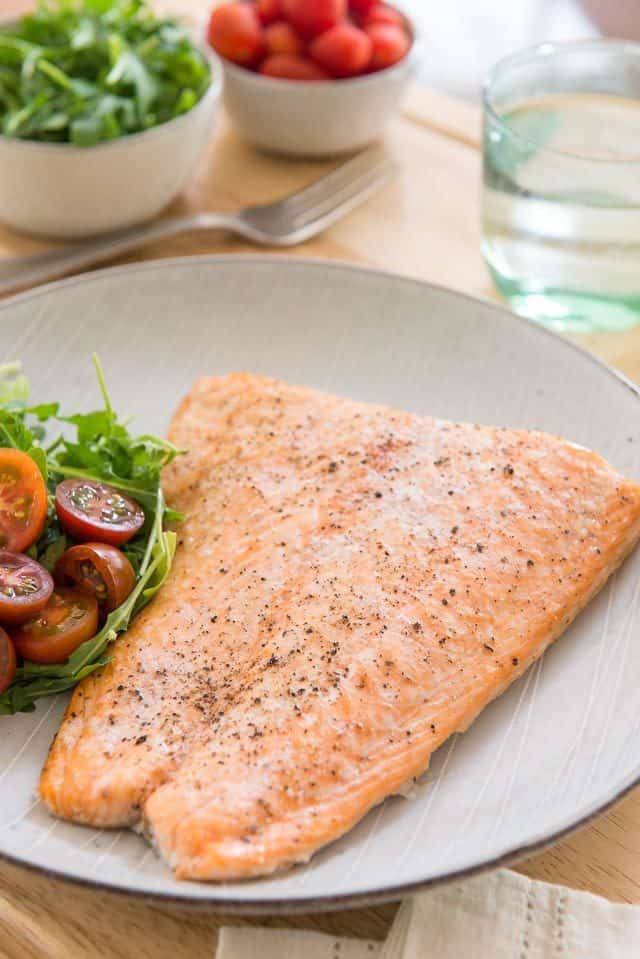
I’m not exaggerating when I say that I make this recipe at least once a week. It’s an integral part of my meal prep and my family always loves eating salmon.
If I’m being honest about my favorite way to eat this popular fish, it’s hands down a pan seared Crispy Skin Salmon just like at the restaurant, where the skin is like a crunchy potato chip on top of the fish. However, that’s a more involved process that involves de-scaling the fish and perfecting the sear, and it’s only meant to be eaten right away.
This Baked Salmon Recipe is simple as heck to prepare, and you can enjoy the fish as is, with flavorings like dill, Dijon mustard, or lemon, or in other recipes altogether. I personally LOVE rubbing it with a little bit of homemade Cajun Seasoning (moistened with a touch of olive oil so the spices don’t burn). Leftovers also keep beautifully.
What’s nice too is you can make as little or as much as you want. When I’m serving a lot of people, I’ll cook a whole side of salmon, and the cook time is more or less the same.
Tips for Best Results
The type of salmon you use matters – Types of salmon vary wildly in terms of eating experience. Farmed species tend to be fattier (and therefore more moist) than wild-caught salmon as a rule of thumb, but even wild varieties vary tremendously from species to species. I discuss this in more detail below, plus my recommendations.
Try to get a center cut piece – Ask the fishmonger to cut you a center cut portion, if possible, that is even in thickness. This will help the fish cook more evenly, instead of having some overcooked or undercooked parts.
Aim for medium – Salmon is fully cooked at 140F, but can generally be eaten safely at 125F. This gives you a more moist interior and delicious eating experience.
Because I cook this fish so often, I’ve experimented with many different temperatures and cooking times. I find that oven baked salmon cooks best at higher temperatures for less time, and gives you moist pieces that flake gently. You can see the moisture shimmering on these salmon flakes right here:
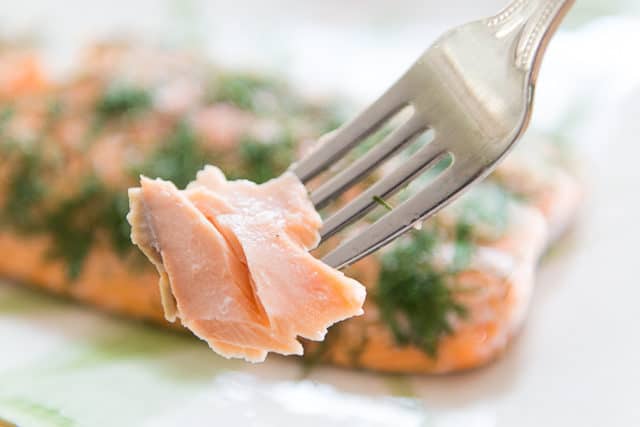
Farmed vs Wild
As a rule of thumb, wild salmon is more prone to becoming dry and overcooked, as it generally has less fat than farmed. I’ve tried 8 different types of farmed and wild salmon, and my preference for wild is King salmon, but it’s also the most expensive.
My favorite budget option is Whole Foods Farmed Atlantic Salmon, which has great flavor and moisture. Sockeye salmon and Coho salmon species tend to be more dry, so be extra careful with overcooking. Avoid Chum salmon, which has an inferior flavor to other species.
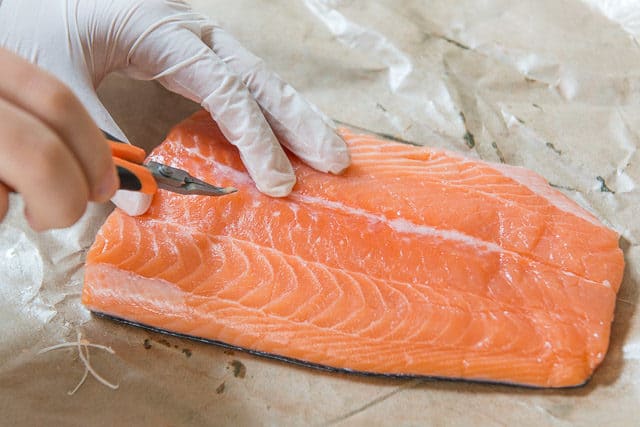
Remove the Bones
Always remove the pinbones from your salmon fillets, as they are particularly big and thick, and a choking hazard. Sometimes the fishmonger has already removed the bones from the fish, but when you have to do it yourself, it’s easiest with tweezers. Trust me, you cannot pull the bones out with your fingers.
Because I make this recipe so much I bought these tweezers (affiliate), which is the best way to remove the bones. I’ve also been able to pull the bones out with tongs in a pinch, but it’s a little tedious and harder to grip.
To remove the bones, you can feel along the flesh to see where they are poking out, then grab them with the tweezers.
Next, season the fish with kosher salt and freshly cracked black pepper:
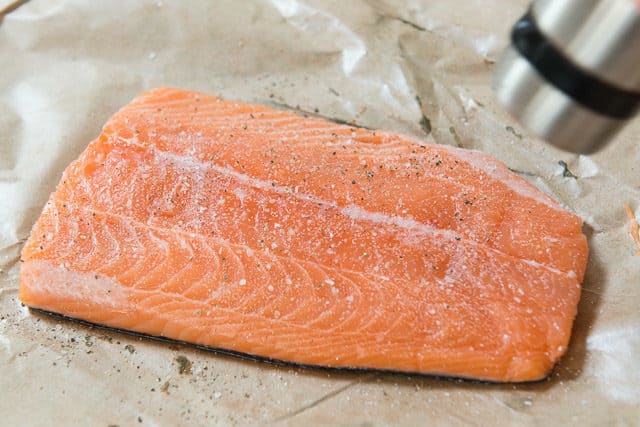
Sometimes if I have it, I’ll add fresh herbs like chopped dill. Other nice toppings are Dijon mustard mixed with pure maple syrup, teriyaki sauce, Cajun Seasoning, or simply a sprinkle of smoked paprika.
You may also brush with melted butter, but know that it will brown a bit at the temperature we’re cooking at.
If I’m using the fish for salads or other dishes, I’ll just leave it plain with salt and pepper.
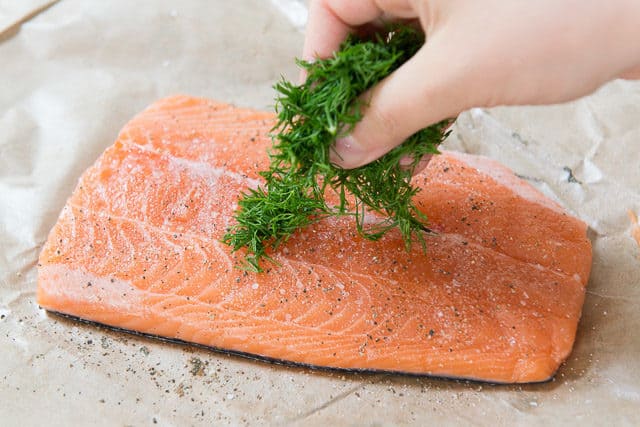
Next, I like to prepare an aluminum foil lined or parchment paper-lined sheet pan to place the fillet on for baking.
I find that even if you grease the bottom of the pan with oil, the salmon skin always sticks anyway, and it’s a pain to scrub it off. So I make cleanup easy by lining my rimmed baking sheet.
On that note, I also do not bother patting any sides of the salmon dry with a paper towel, since we aren’t looking to accomplish much browning here.
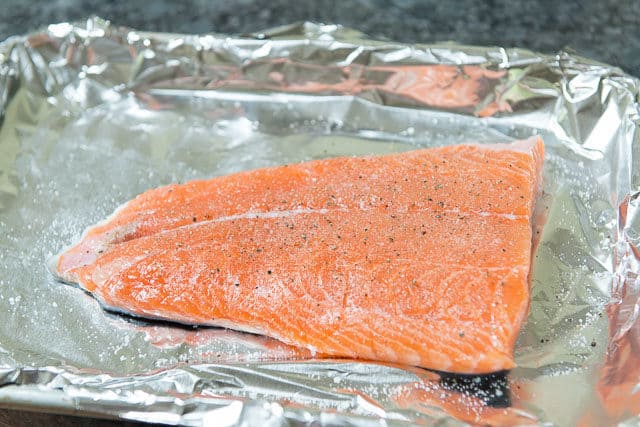
How Long to Bake Salmon
Timing definitely depends on the thickness of your salmon. Typically for a 1″ thick piece, about 12-14 minutes of baking time is perfect in a 425F oven.
Remember that the maximum temperature you want to cook the fish to is 140 degrees F, which is fully cooked (whereas chicken is 165F). I usually aim for an internal temperature of 125-130F, measured with an instant read thermometer at the thickest part of the salmon, so there’s still some pink inside. Slightly undercooking is the key to tender salmon.
If you’re using a wild variety, you’ll want to watch the fish more closely, as there’s less fat there and it’s easier for it to dry out.
How to Check for Doneness
I buy the same size piece from the store so I’ve learned what the timing is, but if you crack the oven door and look, you’ll see when the fish has changed from the deeper orange and shiny/glossy exterior, to the cooked lighter orange color and more opaque exterior. Once the shiny exterior is gone, it should be done within a minute or two, and you can double check with a thermometer.

How to Serve It
Serve the baked salmon immediately after removing from the oven, when it’s at its peak juiciness and moisture. You can serve it with light side dishes like Roasted Parsnips, Cilantro Lime Cauliflower Rice, Greek Zucchini Salad, or Carrot Raisin Salad. A simple squeeze of lemon juice is also nice! You can serve it with lemon slices on the plate, so people can decide for themselves.
If you’d like to add a sauce, I recommend Basil Pesto, Romesco, or Cilantro Jalapeño Sauce. A simple lemon butter (equal parts by weight of both) is also a delicious sauce that’s easy to make quickly.
You can also use this as the main protein for salads like Cobb Salad or Kale Salad.
Next try my Salmon Cakes recipe. You can absolutely use leftover salmon here for the salmon patties in that post.
Recipe Tips and FAQ
Keep in an airtight container in the fridge for up to 5 days. Try to finish in 3-4 days for optimal flavor.
Yes, store in an airtight container for up to 3 months. To thaw, leave in the refrigerator overnight.
The best options are in the microwave or in the oven. For the microwave, do 30-second intervals at 50% power, until warmed through, being very careful not to overcook the fish. For the oven, try 300F for 10 minutes, until warmed through.
Did you enjoy the recipe? Please leave a 5-star rating in the recipe card below and/or a review in the comments section further down the page. Or, follow me on Facebook, Instagram or Pinterest!
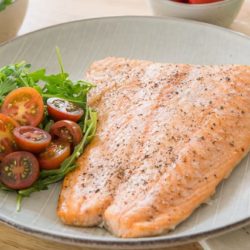
Baked Salmon
Ingredients
- 1 lb fillet of salmon *
- salt
- freshly ground black pepper
Instructions
- Preheat the oven to 425F. Line a baking tray with aluminum foil or parchment paper.
- Unless they've been removed already by the fishmonger, remove the pinbones from the fillet with tweezers.
- Season the top of the fish generously with salt, about 1/2 tsp for a 1lb piece. I don't season the bottom of the fish, since I discard the skin.
- Add freshly ground black pepper to the fillet, about 1/4 tsp, or to your taste.
- Place the fish on the lined tray, and bake for 12-14 minutes, until the top is no longer shiny and the fish registers between 125-140F in the middle, depending on desired doneness. 125F is for medium, and 140F is for fully cooked.
- Serve and enjoy!
Notes
Nutrition
Nutrition is estimated using a food database and is only intended to be used as a guideline for informational purposes.
This post contains affiliate links.

36 Comments on “Baked Salmon”
My apologies as I looked for a way to contact you outside of this chat, but you have a typo in the ‘How do you reheat Baked Salmon?’ inquiry section. You said ‘micorwave’ whereas I think you mean to say: ‘oven’ at 359 degrees for 10 mins.
I am trying your salmon easy bake recipe right now for the first time and it looks perfect! Thanks for your assistance with baking my Salmon!
I made a typo as well! Lol, darn fingers.
I meant *300 degrees, not 359.
Thank you Kelsey!! I appreciate it.
I’ve tried to bake salmon before & burned it. I’m using this recipe tonight. I think I can do this! 🤞🏼
Looks good gonna give it a try Thanks
How long should I cook it for a 3lb salmon?
I’ve been trying different salmon recipes during our “safer at home” mandate. This one is really the best so far!! However, my one inch fillets took 25 minutes at 425 degrees….and they were very moist!
Oh boy..
This is my first attempt at making salmon. Thank you for the recipe. I hope it turns out okay!
By far the best salmon I’ve ever made! Even my young kids ate it!
I love the fact that when I take it out of the oven and rest it, when I cut the filet, it easily separates from the skin, which we do not like.
Thank you sooo much for this recipe. I now have salmon once a week. Hubs is on dialysis and it’s very good for him and your recipe is so easy and soooooo good. TY again.
The recipe turned out perfectly! Thank you!
ikr????? I added cajun seasoning with the olive oil and it is truly awesome!
I added melted butter and seafood seasoning but everything else I did to the recipe! My beau loved it and so did I🤗
Why do you discard the skin? I feel like that’s one of the best compliments to the texture & taste of the fish.. should I be considering something else? Otherwise, baked like this to a less doneness level make it perfect 👌🏼.. skin on of course lol
I love salmon skin when it’s seared (and I have a recipe for that on my site). Baked though, it’s almost always stuck to the sheet pan and soggy, so I don’t bother. But you do you! Enjoy 🙂
Ahh..ok.. I will try searing next time.. you’re right, the skin does get soggy. Been creating a avocado, red onion, greek yogurt, dill to complement it with 🙂
My first time trying to bake my own salmon.
Wish me luck.
Also, only my second time ever tasting it.